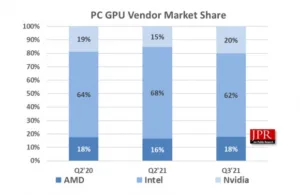Jon Peddie Research reports the growth of the global PC-based Graphics Processor Units (GPU) market reached 101 million units in Q3’21 and PC CPUs shipments increased by 9% year over year. Overall, GPUs will have a compound annual growth rate of -1.1% during 2020–2025 and reach an installed base of 3,249 million units at the end of the forecast period.
Over the next five years, the penetration of discrete GPUs (dGPU) in the PC will grow to reach a level of 31%.
AMD’s overall market share percentage from last quarter increased 1.4%, Intel’s market share decreased by -6.2%, and Nvidia’s market share increased 4.86%, as indicated in the following chart.
Quarterly shipments and market share percentages and year-to-year results
Overall GPU unit shipments decreased by -18.2% from last quarter, AMD shipments decreased by -11.4%, Intel’s shipments decreased by -25.6%, and Nvidia’s shipments increased 8.0%.
Quick highlights
- The GPU’s overall attach rate (which includes integrated and discrete GPUs, desktop, notebook, and workstations) to PCs for the quarter was 125%, up 7.6% from last quarter.
- The overall PC CPU market decreased by -23.1% quarter-to-quarter and increased 9.2% year-to-year.
- Desktop graphics add-in boards (AIBs that use discrete GPUs) increased by 10.9% from the last quarter.
- This quarter saw a -6.9% change in tablet shipments from last quarter.
The third quarter used to be the strongest relative to Q2, but recessions and pandemics have scrambled seasonality. Even so, this quarter was the lowest ever, from the previous quarter. This quarter was down -18.2% from last quarter which way is below the 10-year average of -5.2%.
GPUs are traditionally a leading indicator of the market because a GPU goes into a system before the suppliers ship the PC. Most of the semiconductor vendors are guiding up for the next quarter, an average of 2.7%. Last quarter they guided -1.5% which was too high.
Average selling prices remain high as supply is still constrained.
The low-end of the notebook market is saturated with Chromebooks resulting in an ironic inventory buildup during a short-supply situation.
The discrete notebook market has benefited and suffered due to COVID. Notebook sales surged as people stayed home to work. Then Chromebooks took off and undermined the low-end of notebooks GPUs. It will take until Q1 ’22 to get back to normal, if then.
Jon Peddie, President of JPR, noted, “Covid continues to unbalance the fragile supply chain that relied too heavily upon a just-in-time strategy. We don’t expect to see a stabilized supply chain until the end of 2022. In the meantime, there will be some surprises.”
Most of the semiconductor vendors are guiding up for the next quarter by an average of 3%. Some of that guidance is based on normal seasonality, but there is still a Coronavirus impact factor and a hangover in the supply chain.
JPR also publishes a series of reports on the graphics Add-in-Board Market and PC Gaming Hardware Market, which covers the total market, including system and accessories, and looks at 31 countries.
Pricing and availability
JPR’s Market Watch is available and sells for $2,750. This report includes an Excel workbook with the data used to create the charts, the charts themselves, and supplemental information. The annual subscription price for JPR’s Market Watch is $5,500 and includes four quarterly issues. Full subscribers to JPR services receive TechWatch (the company’s bi-weekly report) and a copy of Market Watch as part of their subscription.
About Jon Peddie Research
Dr. Jon Peddie has been active in the graphics and multimedia fields for more than 30 years. Jon Peddie Research is a technically oriented multimedia and graphics research and consulting firm. Based in Tiburon, California, JPR provides consulting, research, and other specialized services to technology companies in various fields, including graphics development, multimedia for professional applications and consumer electronics, high-end computing, and Internet-access product development. JPR’s Market Watch is a quarterly report focused on PC graphics controllers’ market activity for notebook and desktop computing.

